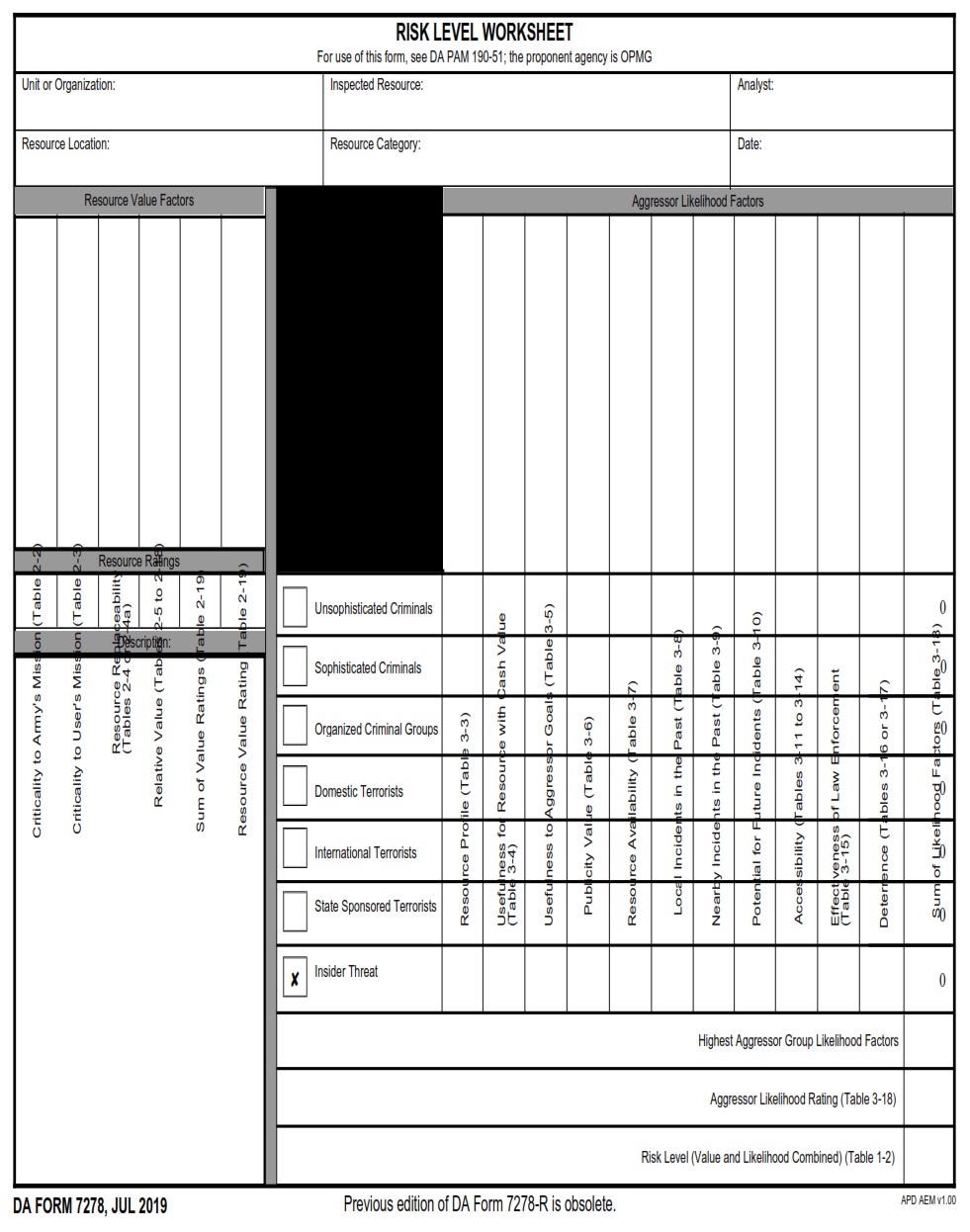DAFORMFILLABLE.COM | DA FORM 7278 Fillable – Army Pubs 7278 PDF – The DA FORM 7278 – Risk Level Worksheet is an essential document used by the United States Army for assessing and documenting the risk levels associated with various tasks and operations. This form, officially known as DA FORM 7278, was last updated on July 1, 2019 and is currently active. It is prescribed by PAM 190-51 and managed by the Provost Marshal General (PMG). The form is classified as unclassified and approved for public release with no distribution restrictions, ensuring it is accessible to all relevant personnel.
DA FORM 7278 – Risk Level Worksheet
| Form Number | DA FORM 7278 |
| Form Title | Risk Level Worksheet |
| Form Date | 7/1/2019 |
| Form Proponent | PMG |
Purpose and Importance of DA FORM 7278
The primary purpose of the DA FORM 7278 – Risk Level Worksheet is to provide a structured method for evaluating risks in military operations. This worksheet helps in identifying potential hazards, assessing the level of risk associated with these hazards, and determining appropriate mitigation measures. By systematically addressing risks, the form contributes to enhancing safety and operational effectiveness.
Key Features of DA FORM 7278
- Pub/Form Number: DA FORM 7278
- Pub/Form Date: 07/01/2019
- Pub/Form Title: Risk Level Worksheet
- Pub/Form Proponent: Provost Marshal General (PMG)
- Pub/Form Status: Active
- Security Classification: Unclassified
- Distribution Restriction Code: Approved for public release; distribution is unlimited
- Prescribing Directive: PAM 190-51
Utilizing the Risk Level Worksheet
DA FORM 7278 is designed to be user-friendly and straightforward. The form is divided into several sections, each targeting a specific aspect of risk assessment:
Identifying Hazards
The first step in using the DA FORM 7278 involves identifying potential hazards that could impact the mission or task. This could include environmental factors, equipment issues, personnel readiness, and other relevant factors.
Assessing Risk Levels
Once hazards are identified, the next step is to assess the level of risk associated with each hazard. This involves evaluating the severity and probability of the hazard occurring. The form provides a matrix to help users systematically determine risk levels.
Mitigation Measures
After assessing the risks, appropriate mitigation measures must be identified and documented. These measures are designed to reduce the likelihood or impact of the hazards. Implementing effective mitigation strategies is crucial for minimizing risks and ensuring mission success.
Continuous Monitoring
Risk assessment is an ongoing process. DA FORM 7278 emphasizes the importance of continuous monitoring and re-evaluation of risks throughout the operation. This ensures that new hazards are identified promptly and existing mitigation measures remain effective.
Compliance and Reporting
Adhering to the procedures outlined in DA FORM 7278 is not just a best practice but a requirement as prescribed by PAM 190-51. Proper use of this form ensures compliance with military safety protocols and enhances the overall safety culture within the organization.
Updates and Revisions
The current version of DA FORM 7278 supersedes the previous version, DA FORM 7278-R, which was last updated on June 1, 2019. The updated form reflects the latest standards and practices in risk assessment and management.
Accessibility and Distribution
The DA FORM 7278 is unclassified and approved for public release, making it accessible to all personnel involved in risk management activities. The form can be freely distributed, ensuring that it is readily available when needed.
Conclusion
The DA FORM 7278 – Risk Level Worksheet is a vital tool for the United States Army, providing a structured approach to risk assessment and management. By identifying hazards, assessing risks, and implementing mitigation measures, this form helps enhance the safety and effectiveness of military operations. Its widespread availability and prescribed use ensure that all personnel can contribute to a robust safety culture, ultimately supporting mission success.
For more detailed information and access to the form, individuals can refer to the official military publications or the Provost Marshal General’s office.
